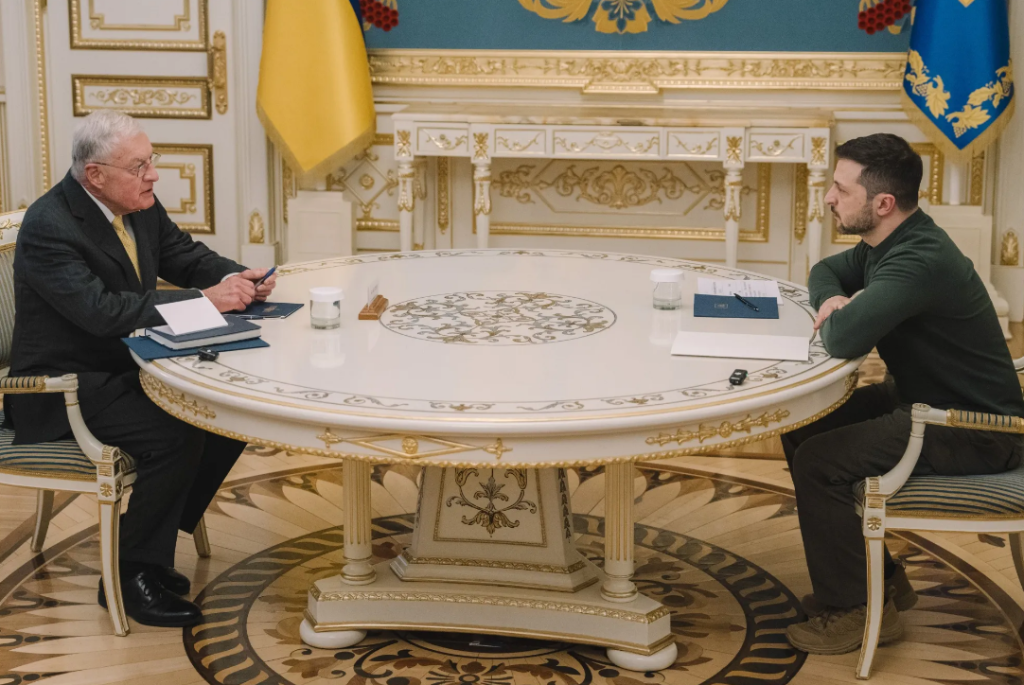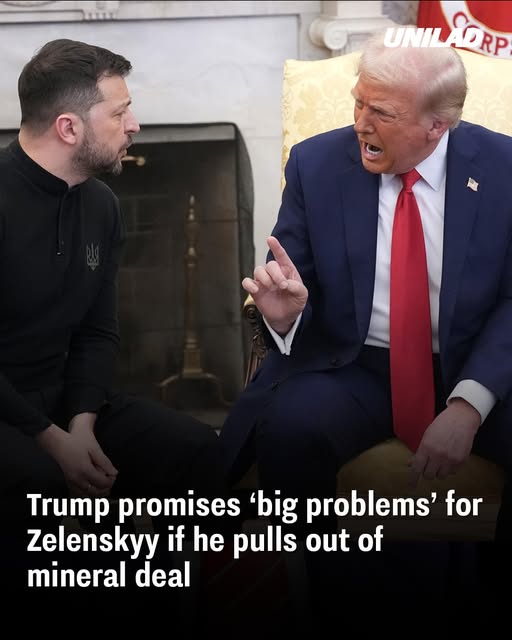Recent developments have intensified tensions between the United States and Ukraine, centering on a proposed mineral deal that has sparked controversy and diplomatic strain.
Background of the Mineral Deal
The U.S. administration, under President Donald Trump, has been advocating for a significant agreement with Ukraine to access its vast reserves of rare earth minerals. These minerals are essential components in various technologies, including electronics and defense systems. The proposed deal would grant the U.S. substantial rights to extract and profit from these resources, with the intent of compensating for the extensive economic and military aid provided to Ukraine over the past three years. However, the terms have raised concerns within Ukraine regarding sovereignty and economic independence.
President Trump’s Warnings to President Zelenskyy
President Trump has publicly accused Ukrainian President Volodymyr Zelenskyy of attempting to withdraw from the mineral agreement. He warned that such actions would lead to “big, big problems” for Ukraine, emphasizing the unlikelihood of Ukraine joining NATO. Trump stated, “He’s trying to back out of the rare earth deal… If he does that, he’s got some problems. Big, big problems.”

Ukrainian Concerns and Response
President Zelenskyy has expressed reservations about the proposed deal, highlighting the absence of security guarantees for Ukraine. He emphasized the need for a legally sound agreement that safeguards Ukraine’s interests, stating, “In my opinion, it does not protect us. It is not ready to protect us, our interests.” Zelenskyy has withheld approval, calling for further review and consultation with legal advisors.
Diplomatic Strains and Negotiation Challenges
The negotiations have been marked by public disputes and diplomatic strains. Reports indicate that discussions between Trump and Zelenskyy have been contentious, with disagreements over the terms and implications of the deal. The U.S. administration’s push for a 50% ownership stake in Ukraine’s rare earth minerals, coupled with demands for repayment of aid, has further complicated the dialogue. Zelenskyy has resisted these terms, leading to a stalemate in negotiations.
International Implications and Reactions
The proposed mineral deal and the ensuing tensions have broader international implications. European allies have expressed concern over the U.S.’s approach, fearing it may undermine Ukraine’s sovereignty and stability. German Chancellor Olaf Scholz emphasized European unity with Ukraine, stating, “We won’t leave Ukraine alone and decide things over their heads.” Additionally, the potential imposition of tariffs on countries purchasing Russian oil, as suggested by President Trump, could impact global markets and strain relations with nations like China and India.
The Role of Rare Earth Minerals in Global Politics
Rare earth minerals are critical in modern technology, particularly in the production of semiconductors, military equipment, electric vehicles, and renewable energy solutions. The global supply chain for these minerals has long been dominated by China, which controls nearly 70% of worldwide production. The United States has been actively seeking alternative sources to reduce its dependency on Chinese exports, making Ukraine’s reserves highly strategic. If the U.S. successfully secures rights to Ukraine’s rare earth minerals, it would mark a significant shift in global supply chains, potentially weakening China’s leverage in this sector. However, critics argue that such agreements should not come at the expense of Ukraine’s economic autonomy, especially while the country is engaged in an ongoing conflict with Russia.
Trump’s Stance on NATO and Ukraine’s Future
In addition to his warnings over the mineral deal, Trump has repeatedly expressed skepticism about NATO and U.S. military aid to Ukraine. During his presidency, he criticized European nations for not contributing enough to NATO’s defense budget, suggesting that the U.S. should not bear the financial burden alone. His recent remarks suggest that U.S. support for Ukraine could be conditional on compliance with American economic interests. This stance contrasts sharply with the current Biden administration’s policy, which prioritizes military assistance and diplomatic backing for Ukraine without explicitly tying it to business deals.
Possible Consequences for Ukraine
If Ukraine refuses the proposed mineral deal, it could face several consequences:
- Reduction in U.S. Aid: Trump’s rhetoric suggests that failure to comply with the deal could lead to a withdrawal or reduction of U.S. economic and military assistance. Given the ongoing war with Russia, this could place Ukraine in a vulnerable position.
- Strained Diplomatic Relations: Ukraine has been striving to maintain strong relationships with Western allies, including the U.S. A breakdown in negotiations could create diplomatic friction and affect Ukraine’s broader geopolitical strategy.
- Economic Challenges: While retaining control over its rare earth minerals would preserve Ukraine’s sovereignty, it might also limit its immediate economic opportunities. A carefully negotiated deal with security guarantees might be a preferable alternative to outright rejection.

The European Perspective
European leaders have reacted cautiously to the ongoing dispute between Trump and Zelenskyy. The European Union has its own interests in ensuring Ukraine’s stability and has been actively providing financial and military assistance. Some European officials fear that if Trump returns to office and significantly alters U.S. foreign policy, it could disrupt their coordinated efforts in supporting Ukraine. Germany and France, in particular, have advocated for policies that ensure Ukraine retains full sovereignty over its natural resources while still securing Western economic partnerships. They argue that any resource deals should be structured in a way that benefits Ukraine first, rather than primarily serving U.S. corporate interests.
Conclusion
The controversy surrounding the U.S.-Ukraine mineral deal underscores the complexities of international agreements involving natural resources, sovereignty, and geopolitical strategy. As negotiations continue, the outcome will likely have significant ramifications for U.S.-Ukraine relations and broader international dynamics. The situation remains fluid, with both nations navigating the delicate balance between economic interests and national security concerns.

















